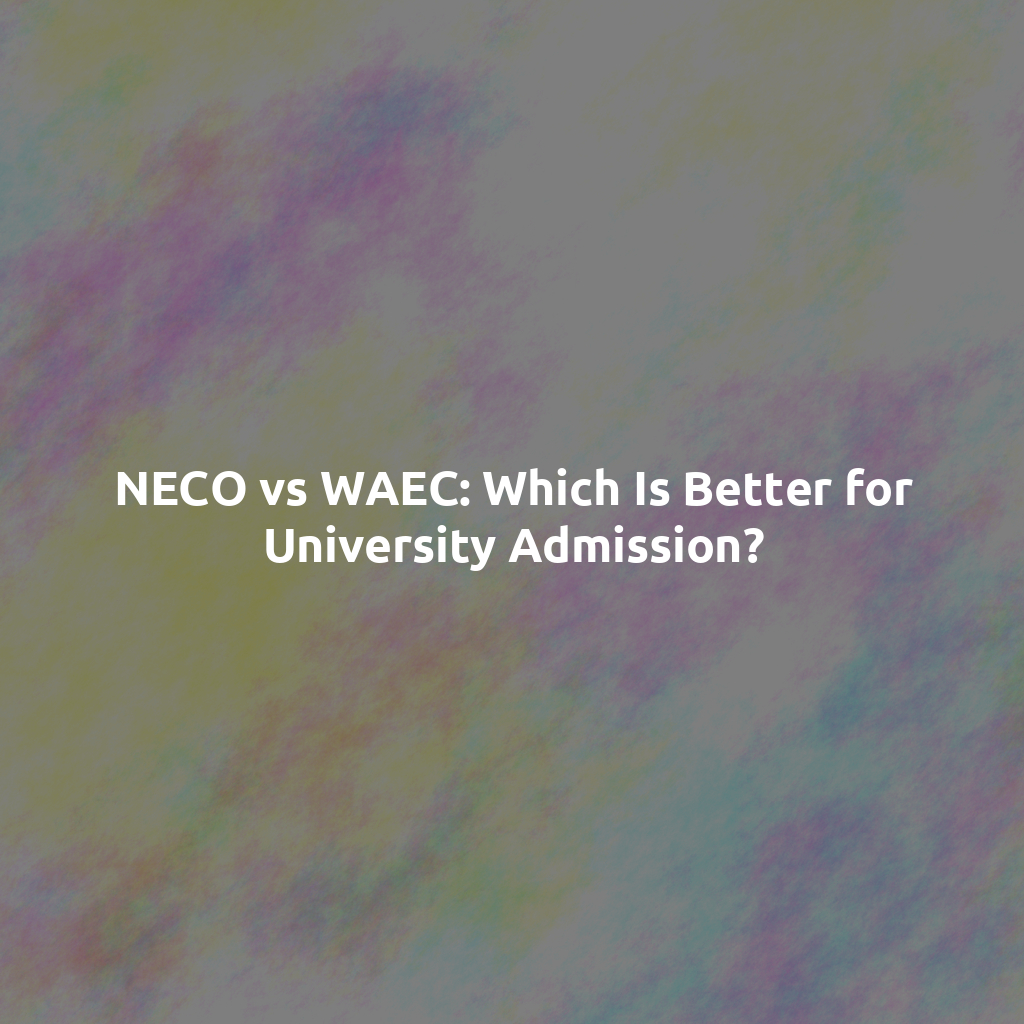Overview of NECO and WAEC
Definitions
NECO stands for the National Examinations Council.
This body conducts the Senior Secondary Certificate Examination in Nigeria.
It also oversees various assessments for candidates in secondary schools.
WAEC, or the West African Examinations Council, provides examinations across West Africa.
The council administers the West African Senior School Certificate Examination.
Advertisements
Both NECO and WAEC serve as essential benchmarks for secondary education.
Purpose of Each Examination
NECO aims to assess students’ academic abilities at the end of their secondary education.
It provides a valid qualification for further education and employment.
Moreover, NECO results are accepted by many Nigerian universities.
WAEC also evaluates students’ readiness for higher education.
Additionally, WAEC certifications are recognized in several countries, enhancing mobility.
Both examinations contribute significantly to the educational landscape.
Students often choose between NECO and WAEC based on their future goals.
Historical Background
The Establishment of NECO
The National Examination Council (NECO) was founded in 1999.
It aimed to provide a national examination for secondary school students.
NECO serves as an alternative to the West African Examinations Council (WAEC).
Advertisements
Furthermore, NECO was established to address challenges faced by WAEC.
For instance, the demand for more effective assessment methods influenced its creation.
Since its inception, NECO has gained credibility among students and parents.
Many view it as a viable pathway for university admissions.
The Establishment of WAEC
The West African Examinations Council (WAEC) was established in 1952.
Initially, it aimed to conduct examinations in various West African countries.
Over the years, WAEC has become a respected examination body.
It serves students from countries such as Nigeria, Ghana, and Sierra Leone.
WAEC’s primary goal is to ensure standardized and high-quality examinations.
Since its formation, it has witnessed several changes and improvements.
These changes enhance its relevance to educational needs in the region.
Comparative Context
Both NECO and WAEC serve critical roles in education.
They offer students standardized assessments for university admissions.
Many students choose one over the other based on their personal preferences.
Factors influencing their choice include results, recognition, and ease of access.
Ultimately, understanding each council’s historical context is vital for students.
This knowledge helps them make informed decisions regarding their education.
Curriculum Differences: NECO vs WAEC
Overview of NECO Curriculum
NECO stands for the National Examination Council.
This body oversees examinations in Nigeria.
The NECO curriculum focuses on practical aspects of learning.
It includes core subjects and vocational training.
As a result, students can acquire real-world skills.
Overview of WAEC Curriculum
WAEC stands for the West African Examinations Council.
It conducts exams in five West African nations.
WAEC emphasizes both theoretical and practical learning.
The curriculum covers a wide range of subjects.
Students receive a balanced education in various fields.
Subjects Offered in NECO and WAEC
Subjects Offered by NECO
NECO offers a diverse range of subjects.
Core subjects include Mathematics, English, and Science.
Additionally, it features vocational subjects like Agriculture and Home Economics.
This variety supports students’ diverse interests and career paths.
Subjects Offered by WAEC
WAEC provides a comprehensive list of subjects as well.
Similar to NECO, it includes Mathematics, English, and Sciences.
Moreover, WAEC also offers subjects in arts and technical fields.
This ensures students have multiple options for university admission.
Comparative Analysis of Subjects
Both NECO and WAEC offer essential subjects for university admission.
However, NECO has a stronger focus on vocational training.
In contrast, WAEC provides a broader range of arts and sciences.
Ultimately, the choice between NECO and WAEC depends on students’ career goals.
Examination Structure
Format of NECO
NECO evaluates students through standardized tests conducted annually.
It includes a variety of subjects relevant to the Nigerian curriculum.
NECO’s exam format primarily consists of written tests.
Additionally, it includes practical assessments in science subjects.
Result verification occurs through strict protocols to maintain integrity.
Format of WAEC
WAEC also conducts its examinations annually for senior secondary students.
Its structure involves both written and oral components for various subjects.
WAEC emphasizes a comprehensive assessment approach.
This includes practical examinations, especially in technical subjects.
Similar to NECO, WAEC enforces stringent result verification methods.
Assessment Methods of NECO
NECO’s assessment focuses on individual subject performance.
Each subject is graded separately with specific criteria.
The grading system ranges from A1 to F9.
NECO also offers continuous assessments throughout the academic year.
This approach helps gauge student progress and understanding.
Assessment Methods of WAEC
WAEC uses a detailed assessment strategy for student evaluation.
It incorporates theoretical and practical examinations in its grading.
The grading system mirrors NECO’s, using A1 to F9 for scores.
Additionally, WAEC encourages project work to demonstrate practical skills.
This is particularly evident in technical and vocational subjects.
Comparative Analysis of Formats
Both NECO and WAEC maintain a rigorous examination framework.
However, NECO tends to have a stronger focus on local context.
WAEC, in contrast, offers a broader regional perspective.
This makes WAEC qualifications more recognized internationally.
Both examination boards receive equal criticism for their grading consistency.
Recognition and Acceptance: How Universities View NECO and WAEC Certifications
Understanding NECO and WAEC
The National Examination Council (NECO) offers examinations in Nigeria.
It primarily serves students who complete secondary education.
In contrast, the West African Examination Council (WAEC) is a regional body.
WAEC conducts examinations for various West African countries.
Both certifications enable students to pursue further education.
University Preferences and Requirements
Universities have specific admission requirements for applicants.
Some institutions prefer the WAEC certificate over NECO.
This preference often stems from regional recognition of WAEC.
Additionally, WAEC has a longer history, which enhances its reputation.
However, many schools and universities also accept NECO certificates.
Evaluation of Certificates
Universities evaluate these certificates based on results and performance.
Consistently high performance in either examination can improve chances.
Moreover, universities may consider the overall structure of each certificate.
NECO and WAEC have different grading systems that affect perception.
Therefore, students should understand the implications of each.
Regional and International Recognition
WAEC generally possesses stronger international recognition.
This global acknowledgment benefits students who wish to study abroad.
NECO is more localized but is gaining acceptance in certain contexts.
Students planning to travel for education should research universities’ preferences.
Advice for Prospective Students
Choosing between NECO and WAEC requires careful consideration.
Students should assess their academic strengths and preferences.
Consulting with guidance counselors can provide valuable insights.
Additionally, prospective students can explore feedback from peers.
Ultimately, students should select the examination that aligns with their goals.
Success Rates
Pass Rates Overview
Understanding the pass rates of NECO and WAEC is crucial for students.
These rates provide insight into the effectiveness of each exam.
NECO typically has varying pass rates each year.
In contrast, WAEC is known for its more consistent performance.
Statistics of Recent Years
In the last few years, NECO reported a pass rate around 60%.
This rate indicates a significant number of students passed.
Conversely, WAEC has maintained an average pass rate of 75%.
This percentage suggests that more students achieve success through WAEC.
Factors Influencing Success Rates
Certain factors impact the success rates of both examinations.
The quality of preparation plays a substantial role.
Students who study diligently tend to perform better.
Moreover, availability of resources affects outcomes significantly.
Trends Over Time
Over the years, both NECO and WAEC have shown fluctuating trends.
However, WAEC remains more stable in pass rates.
This stability may lead to higher trust among students and parents.
Comparative Analysis
Regional Performance Differences
NECO’s performance can vary widely across regions.
Some states show higher success rates than others.
In comparison, WAEC’s performance is relatively uniform across the country.
Implications for University Admission
Universities often prefer candidates with WAEC certifications.
This preference highlights WAEC’s credibility in the academic community.
Students should consider their options carefully before choosing an exam.
Advice for Students
Preparing adequately for either examination is vital.
Students should take practice tests for better understanding.
Additionally, seeking help from tutors can enhance performance.
Cost Consideration: Comparing Examination Fees and Financial Impact
Understanding Examination Fees
Both NECO and WAEC require students to pay examination fees.
NECO fees generally range from affordable to moderately priced.
In contrast, WAEC fees can be higher depending on the subjects chosen.
Moreover, additional costs may arise from late registration fees.
Financial Impact on Students
The financial burden of examination fees can be significant for families.
For many, deciding between NECO and WAEC hinges on cost.
Families with limited resources often opt for NECO.
Likewise, students seeking to minimize financial strain should weigh their options.
Regional Variations in Fee Structures
NECO’s fee structure is often perceived as more accessible.
However, variations exist across regions and schools.
WAEC offers standardized fees, but they may differ slightly by location.
Consequently, students should research local fee structures thoroughly.
Long-term Financial Considerations
Investing in WAEC may yield higher returns in university admissions.
Quality education can outweigh the initial financial investment.
On the other hand, NECO provides a viable alternative for budget-conscious students.
Ultimately, the choice should align with individual academic goals and financial capabilities.
Impact of NECO and WAEC Results on Higher Education Opportunities
Understanding NECO and WAEC
The National Examination Council (NECO) administers exams for secondary school students in Nigeria.
The West African Examinations Council (WAEC) offers a similar service across multiple West African countries.
Both bodies play crucial roles in shaping educational paths for students.
Differences in Examination Focus
NECO often emphasizes practical assessments alongside theoretical knowledge.
This focus can better prepare students for real-world applications.
Conversely, WAEC prioritizes theoretical understanding, which suits academic pursuits.
Acceptance by Universities
Universities have differing preferences for NECO and WAEC results.
Many Nigerian universities accept both examination results equally.
However, some universities may prefer WAEC for certain programs.
Regional Biases
Regionally, some institutions show a preference for WAEC due to its wider recognition.
In contrast, schools in Nigeria increasingly accept NECO for local admissions.
This shift is driven by increasing confidence in the quality of NECO assessments.
Challenges in Both Systems
Both NECO and WAEC face issues like exam malpractices.
Such challenges can undermine the integrity of the results.
Perception is essential, as universities often weigh the credibility of results heavily.
Future Considerations
Students should consider university requirements when choosing between NECO and WAEC.
Researching specific course entry requirements can guide students effectively.
Additionally, students should stay informed about any changes in admission policies.
Ultimately, both exams offer paths to higher education, but personal circumstances matter greatly.
Evaluating Which Examination Provides Better Prospects for University Admission
Overview of NECO and WAEC
NECO stands for the National Examination Council of Nigeria.
It administers a Senior Secondary Certificate Examination.
WAEC is the West African Examinations Council.
It also conducts a similar examination across multiple countries.
Both certifications hold significant weight in academic pursuits.
Eligibility and Examination Format
NECO offers examinations for students at the end of secondary school.
It assesses various subjects, including core and elective courses.
Similarly, WAEC evaluates students for their readiness for tertiary education.
Exam formats for both bodies involve multiple-choice and essay questions.
Students must prepare rigorously for both examinations.
Recognition by Universities
Most Nigerian universities recognize both NECO and WAEC results.
However, some universities prefer WAEC certifications.
Prospective students should check university admission requirements.
Some institutions may accept only one type of certification.
Performance and Results Processing
Students often view WAEC as more challenging due to grading standards.
NECO tests are perceived as relatively less rigorous.
Both organizations have made improvements in results processing times.
Timely result release can affect admission timelines for universities.
Cost and Accessibility
Examination fees for NECO and WAEC can vary annually.
Students must consider their financial situations before registration.
Both examinations are accessible across Nigeria and other countries.
Distance learning platforms also assist students in preparation.
Personal Preferences and Study Habits
The choice between NECO and WAEC often depends on individual preferences.
Students should align their study habits with the exam format.
Effective preparation increases the likelihood of success in either exam.
Peer discussions and guidance can further clarify options.
Making an Informed Decision
Evaluating NECO and WAEC involves understanding individual academic goals.
Students should assess university requirements carefully.
Additionally, seek advice from teachers or education professionals.
Ultimately, commitment and determination play crucial roles.






